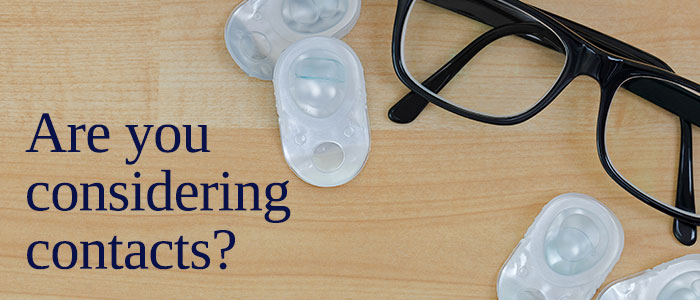
Are you thinking about starting to wear contact lenses or switching to a different type of contact?
Wearing contacts can make a big difference in the way you see things – such as sharper details and brighter colors. And technology has made contacts more comfortable than ever.
While we look forward to discussing contact lenses and working closely with you to find the right type of lens to meet your needs, here are some things for you to think about:
Reasons to consider contact lenses
- Contact lenses move with your eye, allow a natural field of view, have no frames to obstruct your vision and greatly reduce distortions.
- Unlike glasses, they do not fog up or get water spots.
- Contact lenses are excellent for sports and other physical activities.
- Many people feel they look better in contact lenses.
- Compared to eyeglasses, contacts may offer better, more natural sight.
Some things to remember about contact lenses
- Compared to glasses, contact lenses require a longer initial examination and more follow-up visits to maintain eye health. Lens care also requires more time.
- If you are going to wear your lenses successfully, you will have to clean and store them properly, adhere to lens-wearing schedules and make appointments for follow-up care.
- If you are wearing disposable or planned replacement lenses, you will have to carefully follow the schedule for disposing the used lenses and using new ones.
Contact lens types
There are two general types of contact lenses: hard and soft.
Rigid gas-permeable (RGP):
The hard lenses most commonly used today are rigid gas-permeable lenses (RGP). They are made of materials that are designed for their optical and comfort qualities. Hard lenses hold their shape, yet allow the free flow of oxygen through the lenses to the cornea of your eye.
RGPs provide excellent vision, have a short initial adaptation period, and are easy to care for. RGPs are comfortable to wear, have a relatively long life, and correct most vision problems.
The disadvantages are that RGPs require consistent wear to maintain how comfortable they feel, and can occasionally slip off-center of the eye.
Soft contact lenses:
Soft lenses are the choice of most contact wearers. These lenses are comfortable and come in many versions, depending on how you want to wear them.
Disposable-wear lenses are removed nightly and replaced on a daily, weekly, biweekly, or monthly basis and are easy to get used to wearing.
Daily-wear contacts do not need to be cleaned and are great for active lifestyles but don't correct all vision problems and vision may not be as sharp as with RGP lenses.
Extended-wear soft contacts can usually be worn up to seven days without removal. Be sure to ask us about extended-wear contacts and a possible greater risk of eye infections.
Colored soft contacts change your eye color, the appearance of your eye, or both. They are available by prescription and should only be worn after an eye exam and fitting by an eye-care professional. Over-the-counter colored contacts are illegal in some states and pose a serious danger to your eye health.
Bifocal or multifocal
Bifocal or multifocal contact lenses are available in both soft and RPG varieties. They can correct nearsightedness, farsightedness and astigmatism in combination with presbyopia. Visual quality is often not as good as with single vision lenses; however, for some people the ability to correct presbyopia is worth it.
Contacts are a great fit for many patients but don't forget to be prepared
Carry a backup pair of glasses with a current prescription—just in case you have to take out your contacts. Contacts can make your eyes more light-sensitive, so don't forget to wear sunglasses with UV protection and a wide-brim hat when you’re in the sun.
Hygiene is the most critical aspect to successfully wearing contacts
When cared for properly, contact lenses can provide a comfortable and convenient way to work, play, and live the millions of people who wear them. While contact lenses are usually a safe and effective form of vision correction, they are not entirely risk-free.
Contact lenses are medical devices, and failure to wear, clean, and store them as directed can increase the risk of eye infections. Not following your eye doctor’s directions raises the risk of developing serious infections. Your habits, supplies, and eye doctor are all essential to keeping your eyes healthy.
We’re here to help
If you are interested in wearing contact lenses, we will provide you with a thorough eye examination and an evaluation of your suitability for contact lens wear. Contact us today for more information about contact lenses and to schedule a contact-fitting exam. We’ll discuss the best options for your visual and lifestyle needs.
This blog provides general information and discussion about eye health and related subjects. The words and other content provided in this blog, and in any linked materials, are not intended and should not be construed as medical advice. If the reader or any other person has a medical concern, he or she should consult with an appropriately licensed physician. The content of this blog cannot be reproduced or duplicated without the express written consent of Eye IQ.


